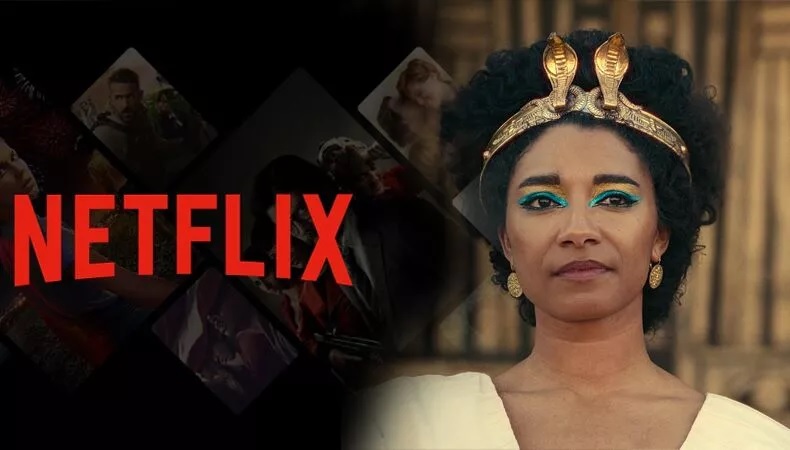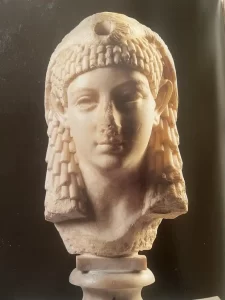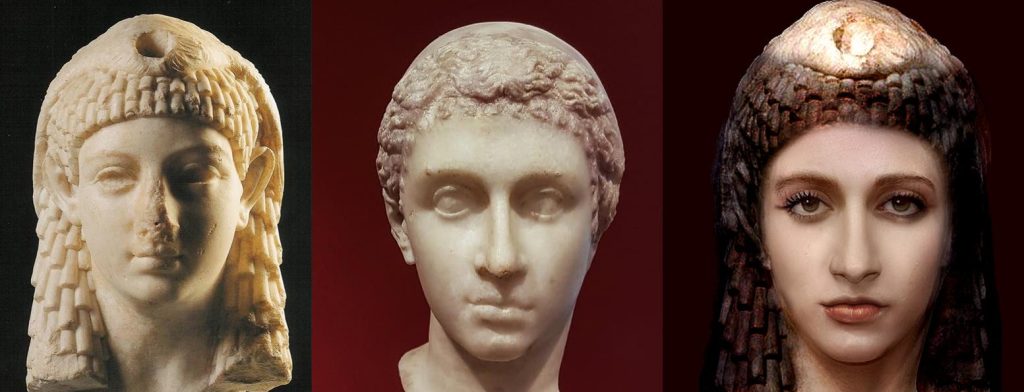
By Salma Heram / Arab America Contributing Writer
Arab-America – On April 12, 2023, Netflix released a trailer for their upcoming documentary series Queen Cleopatra. This season comes as the second in a new documentary series by Jada Pinkett Smith depicting African Queens.
However, upon its release, the trailer sparked much controversy, particularly between Egyptians and African Americans. In fact, Egypt has recently announced its own documentary on Cleopatra in retaliation, as well as a potential lawsuit against Netflix.
Follow along as we detail the arguments surrounding the film, the motivations behind it, the perspective of Egyptians, and the controversy on the depiction of Cleopatra.
Controversy Surrounding Queen Cleopatria’s Race
Upon watching the trailer, it is clear to the viewer that Queen Cleopatra and the Egyptians surrounding her are depicted by African American actors. The actress playing the role of Cleopatra, Adele James, is herself of mixed-race descent, a choice Netflix says “is a nod to the centuries-long conversation about the ruler’s race”.
 This depiction is not accidental; in fact, in the trailer, an Egyptian historian, Dr. Islam Issa, states that he imagines Cleopatra to have “curly hair like me and a similar skin color.” Her statement is followed immediately by a Black historian, Dr. Shelley Haley, asserts that she recalls her grandmother telling her as a child, “I don’t care what they tell you in school, Cleopatra was Black.”
This depiction is not accidental; in fact, in the trailer, an Egyptian historian, Dr. Islam Issa, states that he imagines Cleopatra to have “curly hair like me and a similar skin color.” Her statement is followed immediately by a Black historian, Dr. Shelley Haley, asserts that she recalls her grandmother telling her as a child, “I don’t care what they tell you in school, Cleopatra was Black.”
This juxtaposition of these two perspectives is a telling sign of the series creators’ biased perspective, one that favors the opinion of Cleopatra and other Egyptians as Black. This opinion and depiction in the film caused an uproar on both social media and in conversation, particularly from Egyptians.
The Egyptian Perspective
The main frustration from Egyptians is the portrayal of Queen Cleopatra and other Egyptians by Black actors, as well as the assertion of claims of her Black identity in both the trailer and by the film’s director.
Furthermore, frustration arises from the fact that the series is being marketed and labeled as a documentary, or a docudrama.
Most Egyptians feel that if this was a work of fiction, the issue with Cleopatra’s depiction would be less serious, but because this show is being established as a documentary, a higher level of historical accuracy is expected, and with it, stricter criticism.
The issue is not so much whether Cleopatra should be depicted as Black or White, but rather the idea that Egyptians should be able to tell their own history, and that because this is a documentary, careful historical sensitivity is needed to tell an accurate story. As such, failure to do so has been seen by many as an attempt at further systematic erasure of the Egyptian identity.
Several Egyptian experts have come out to speak on the facts relating to Queen Cleopatra’s appearance, including Dr. Zahi Hawass, a world-renowned Egyptologist and former Minister of Antiquities of Egypt.
Was Cleopatra Black?

In a news column, Dr. Hawass asserts that Queen Cleopatra was not Black, citing several pieces of evidence, including statues of her made from alabaster depicting her Hellenistic features and pale skin that he excavated from her tomb near Alexandria, Egypt.
The Egyptian Ministry of Tourism and Antiquities further emphasized this fact, providing images of several artifacts as evidence. The Ministry went on to say that it is clear through scientific evidence, including DNA testing, that Cleopatra did not have sub-Saharan African ancestry, and therefore would not be Black as we define the term today.
This is further evidenced by her features, as seen in both states and coins depicting her appearance, which do not show any evidence of sub-Saharan African features.
As such, any true experts in Ancient Egyptian history can easily and confidently affirm that Cleopatra had no Black ancestry, and therefore the depiction of her in Netflix’s show is completely false and falsifies the claim of it being a “docudrama.”
Many Egyptians, like Dr. Hawass and well-known comedian Bassem Youssef, point to the Afrocentric movement as possibly to blame for this clear historical fallacy being popularized by Netflix.
In an interview with Piers Morgan, Youssef details that this new show is part of “continuous cultural appropriation and falsification of history by the so-called Afrocentric movement.”

Youssef went on to say that the Afrocentric movement was originally started in the last century with good intentions, seeking to teach African-Americans about their rich history in West Africa, citing the great empires of Benin, Ghana, Mali, and Songhai. However, in recent years this ideology has expanded to include Egypt, and unrightfully so, thereby calling modern-day Egyptians invaders and intruders in their own country.
Dr. Hawass seems to agree with Youssef, speculating that the Netflix series may be seeking to capitalize and take commercial advantage of this contention within the African-American community and wider African diaspora.
Retaliation from the Egyptian Government
In response to the country’s outrage at the Netflix series, Egyptian lawyer Mahmoud al-Semary filed a complaint with the public prosecutor demanding that he take “the necessary legal measures” and block access to Netflix’s services in Egypt.
Additionally, in retaliation, Al-Watha’eqeya, an Egyptian television channel, has announced preparations for the production of a documentary film on Queen Cleopatra and her life, informed by Egyptian experts on Ancient Egyptian history.
The Show’s Release
On May 10, the “Queen Cleopatra” Netflix series season was released, with 4 episodes, each about 40 minutes long. However, within a week of its release, it has had some of the lowest ratings in television history, with only a 2% on Rotten Tomatoes and a 1.1/10 on IMDb.
Although it is unclear, one can speculate that many of these ratings are done by those in solidarity with the Egyptian people, criticizing the historically inaccurate depiction of the great Egyptian Queen and the false labeling of the series as a historical documentary and docudrama.
Looking Ahead
One can look forward to the Egyptian documentary on the life of Queen Cleopatra, and we can be confident that it will be informed by the utmost historical accuracy and renowned experts on Ancient Egyptian history.
In the meantime, those seeking to learn more about the strength, resilience, and incredible leadership of Queen Cleopatra can view this recently released 90-minute documentary featuring Dr. Hawass and other experts.
This post is published with permission.
Please Pledge to Our Peace Journalism.
Goltune is editorially independent. We set our agenda. No one edits our editors. No one steers our opinion. This is important as it enables us to stay true to our values.
Every contribution we receive from readers like you, big or small, goes directly into funding our journalism. Please support Goltune, large or small.
Send your contributions to our PayPal account: [email protected]
Or, Click the link to pledge your support.
Thank you,
Goltune Editorial Team






